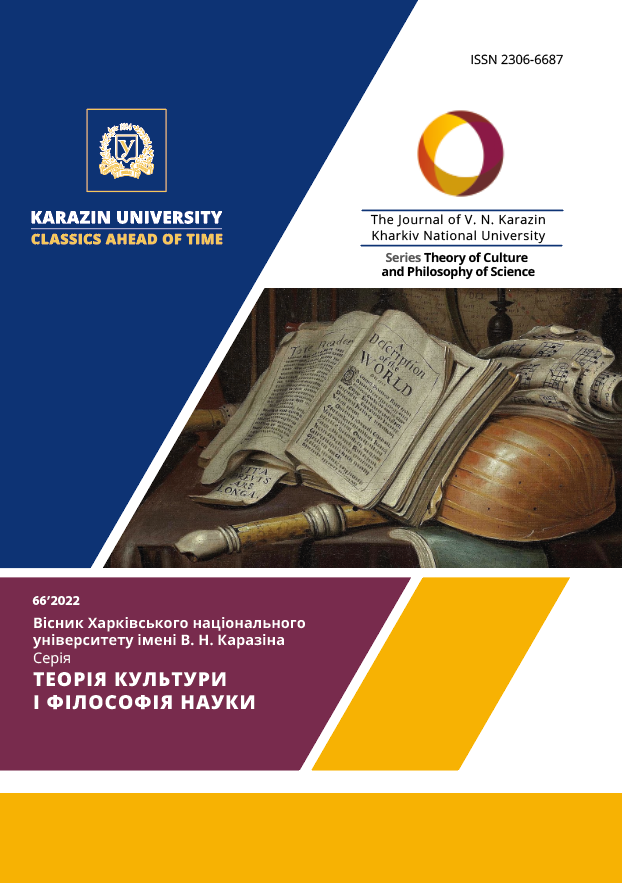SCIENTIFIC AND PHILOSOPHICAL RATIONALITY INTHE CONTEXT OF PARADIGMS OF WESTERN AND EASTERN PHILOSOPHY
Abstract
The article examines the stages of development of ideas about rational thinking, rational scientific knowledge and science as such within the context of the so-called paradigms of philosophy. These paradigms are as follows: Ancient (it is based on the idea of avoiding suffering and achieving happiness in a world alien and indifferent to human aspirations), Abrahamic (the paradigm of Abrahamic religions - Judaism, Christianity and Islam with their monotheism, creationism, fideism), Modern scientific (based on the priority of scientific, beforehand natural knowledge and the picture of the world it offers), the traditional Indian (based on the idea of reincarnation, the wheel of samsara and liberation from it) and the traditional Chinese (with its worldview organismism or a worldview that considers the universe as a single organism, the organs of which are individual people and other living beings). The first three paradigms represent the stages of development of the Western tradition, starting from ancient times to the present, while the Indian and Chinese paradigms are separate and independent that can in modern conditions represent certain worldview alternatives to Western ideas. The path of development of the Western tradition is analyzed in detail, it is shown that the key role in the formation of the Modern paradigm was played by the change in the perception of Western people from audio-tactile to visual caused by the invention of printing and the wide spread of reading (as it was demonstrated by the Canadian philosopher M. McLuhan). It is also shown that the development of each of these paradigms begins with existential questions about the place and role of the individual in society, which further leads to the raising of the corresponding physical and metaphysical questions with all the ensuing consequences. Rational thinking, scientific ideas and knowledge develop according to this scheme within the framework of each of these paradigms.
Finally, at the end, the hypothesis is proposed that the current postmodern situation is caused on the one hand by the process of emancipation of the humanities, and on the other by the processes of cultural decolonization and the resulting worldview pluralism.
Downloads
References
Ado Pierre. Philosophy as a Way of Life. Translated from French by O. Yosypenko. - Kyiv: Novy Akropolis, 2020. - 312 p. (In Ukrainian)
Ado Pierre. What Is Ancient Philosophy? Translated from French by S. Yosypenko. - Kyiv: Novy Akropolis, 2014. - 428 p. (In Ukrainian)
Biletskyi I.P. The Phenomenon of Science in the Context of Philosophical Paradigms // Bulletin of V.N. Karazin Kharkiv National University, Series: Theory of Culture and Philosophy of Science – 2017, Issue 5. - p. 80-84. (In Ukrainian)
Biletskyi I.P. Mathematics as a Method and as a Spiritual Practice // Bulletin of V.N. Karazin Kharkiv National University, Series: Theory of Culture and Philosophy of Science – 2014, No. 1092. - p. 104-111. (In Ukrainian)
Bilyk Yaroslav Mykhailovych. SOCIOCULTURAL ANALYSIS IN CONTEMPORARY PHILOSOPHY OF SCIENCE // Bulletin of V.N. Karazin Kharkiv National University, Series: Theory of Culture and Philosophy of Science – 2020, Issue 61. - p. 97-102. (In Ukrainian)
Weber M. The Protestant Ethic and the Spirit of Capitalism. Translated from German by O. Pohorilyi. - Kyiv: Osnovy, 1994. - 261 p. (In Ukrainian)
Dao De Jing. Translated into Ukrainian by Yevhen Tarnavskyi. Kharkiv: Folio, 2020. - 90 p. (In Ukrainian)
McLuhan Marshall. The Gutenberg Galaxy: The Making of Typographic Man. Translated from English by A.A. Halushka, V.I. Postnikov. - Kyiv: Nika-Tsentr, 2008. - 392 p. (In Ukrainian)
Plato. The Republic. Translated from Ancient Greek by D. Koval. - Kyiv: Osnovy, 2000. - 355 p.
Russell Bertrand. A History of Western Philosophy. Translated from English by Yu. Lisnyak, P. Tarashchuk. - Kyiv: Osnovy, 1995. - 759 p. (In Ukrainian)
Taglina Yu.S. Homo Insufficiens (the Insufficient Man) – Relationship with Nature and Technology // Bulletin of V.N. Karazin Kharkiv National University, Issue No. 1142. Series "Theory of Culture and Philosophy of Science". - Kharkiv, 2014. - p. 108-111. (In Ukrainian)
BRONKHORST JOHANNES. WHY IS THERE PHILOSOPHY IN INDIA?* (Sixth Gonda lecture, held on 13 November 1998 on the premises of the Royal Netherlands Academy of Arts and Sciences. Amsterdam: Royal Netherlands Academy of Arts and Sciences. 1999.) https://serval.unil.ch/resource/serval:BIB_E23DFD6660FA.P001/REF.pdf (In English)
Comparative Philosophy: Chinese and Western // Stanford Encyclopedia of Philosophy, First published Tue Jul 31, 2001; substantive revision Tue Aug 4, 2020. URL: https://plato.stanford.edu/entries/comparphil-chiwes/ (In English)
Fung Yu-lan. A Short History of Chinese Philosophy // New York, the Macmillan Company, 1958. – 368 p. (In English)
Historicist Theories of Scientific Rationality// Stanford Encyclopedia of Philosophy, First published Wed Jun 14, 2017. URL: https://plato.stanford.edu/entries/rationality-historicist/ (In English)
Makarov Zorislav, Bohatyrchuk Diana. SCIENTIFIC RATIONALITY IN AN EDUCATIONAL CONTEXT: HISTORICAL AND PHILOSOPHICAL ANALYSIS // DOI: https://doi.org/10.30525/978-9934-26-193-0-20 URL: ;http://baltijapublishing.lv/omp/index.php/bp/catalog/download/205/6142/12826-1?inl (In English)
Normile Ian H. Exploring Criticality in Chinese Philosophy: Refuting Generalisations and Supporting Critical Thinking // Studies in Philosophy and Education (2023) 42:123–141. URL: https://doi.org/10.1007/s11217-022-09855-3 (In English)
Radhakrishnan S. Indian Philosophy / New York, the Macmillan Company, 1923. V. 1 – 688 p.,v.2 – 822 p (In English)
Rošker, Jana. (2021). Modern Confucian Epistemology: From Reason to Intuition—And Back // In book: Dao Companion to Contemporary Confucian Philosophy (pp.447-468), 2021. DOI:10.1007/978-3-030-56475-9_20 (In English)
Sheehan Helena Dublin. The assault on scientific rationality: historical analysis and epistemological response // 13th European Skeptics Congress 7‐9 September 2007 Dublin/ - https://doras.dcu.ie/2460/1/assault-on-science.pdf (In English)
Sarukkai, Sundar. Indian Philosophy and Philosophy of Science// New Delhi: Motilal Banarsidass Publishers (2005) . URL: https://philpapers.org/rec/SARIPA (In English)
Tesfay Bisrat. The Rationality of the Process of Theory Change in Science // International Journal of Philosophy, Volume 8, Issue 2, June 2020. - Pages: 49-53. DOI: 10.11648/j.ijp.20200802.14 (In English)
Citations
PARADIGMS OF PRACTICAL PHILOSOPHY IN CONTEXT WORLDVIEW PARADIGMS OF THE EAST AND THE WEST
Biletsky Igor & Taglina Yuliia (2024) The Journal of V. N. Karazin Kharkiv National University, Series "Philosophy. Philosophical Peripeteias"
Crossref




